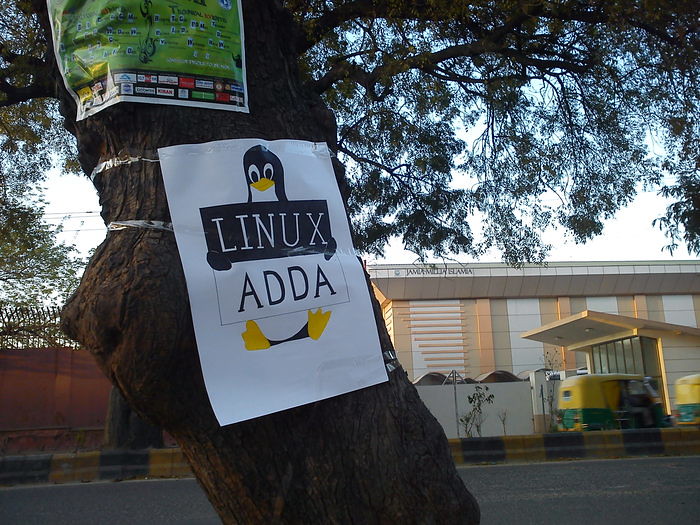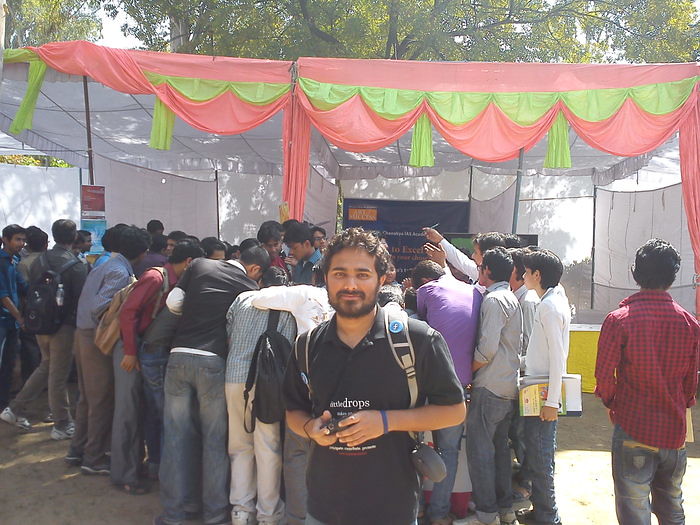The day started with setting-up of Linux Adda. While we were still setting it up, for around an hour everyone was sharing laughter with Kumar Vishwas - a poet of IIT fame. As soon as his humorous poems were over, crowd rushed to the stalls, one of which was Linux Adda. It takes only a glace for someone to get attracted to the Fedora DVDs and Fedora Badges spread over a white-cloth-covered table i.e. our Linux Adda. Have a look at following pictures:


I was amazed to see how students reacted once we started to distribute Badges and DVDs to them. People were sort-of pushing each other to listen what we had to say ( about Fedora, FOSS, DVDs and badges of-course ). We asked them to write their names and email address in the register so the can collect their DVDs and badges. One hour had past in conveying the message and distributing DVDs and badges.
At 2:00pm the Linux Conference started on day 1. With a prime focus towards students, who know very little ( or nothing ) about FOSS, the first talk was «Introduction to FOSS and Linux» by Atul Jha. Atul has this ability to mix-up with the audience so very well, which IMHO is a very good quality. Followed by «Women in Technology» by Priya Kuber, who shared her journey towards contributing to FOSS and why it matters to students. Her emphasis was also on how to start contributing to FOSS. Arun Ghosh, an English professor from IIT-Delhi presented his «Thoughts on GNU/Linux». Last talk for the day was «Moodle CMS» by Guarav Parashar. It was surprizing to know that «Moddle CMS» is not a Content Management System, rather it is a Course Management System. So basically it lets teachers and students do all common activities - assignments, discussion, grading feedback, etc. - without using a single piece of paper. I must say this is the biggest winning point for Moddle CMS. Not only does Gaurav talk about Moodle CMS, he being a professor at his institute, uses it for all the courses and assignments. Someone also mentioned that Moodle CMS is being used at IIT Bombay for quite some time now.
On the second day I gave a presentation on Web Application Development, covering some historical background, approaches to web development and finally with a demo of a Django based project. All the source code and slide details are at github repository . My talk was followed by «How to contribute to FOSS» by Satya Komaragiri. I must say that the talk was very well structured. She gave well-thought examples whenever a question popped from audience. And also that OLPC device was nice. Next talk, «An Intro about Unit test in Python» by Arulalan.T, was quite useful for me as I had never used Python testing frameworks ( except django’s ./manage.py test ). So I learnt something new.
We had a break of around 15 minutes in between.
In the next talk «RabbitMQ: Messaging which works», Mohd. Asif revealed the fact that there are a lot of implementation of messaging borkers, but most of them are proprietary. Of those which are Open Source implementations, I guess RabbitMQ is a one of its kind with a lot of features. Maybe JBoss also has a similar implementation. However, RabbitMQ uses only pull strategy for message propagation. Do we have any Open Source implementation which supports pull and push stragety both? ( I have to do some research on this topic. )
Next up we had «An Update on Fossevents.in» by Satyakaam Goswami. fossevents.in is an idea which he had been working for around over a year now. Of other things he mentioned, the most interesting to me was FOSS Yatra. A unique initiative to promote FOSS among the cities, towns and villages in India. Finally the last talk of the day was «Introduction to PHP» by Ashim. He had roughly around 4 hours with him to prepare and make a presentation on PHP, at the venue itself. This was his first attempt at giving a talk on PHP and it was great :).